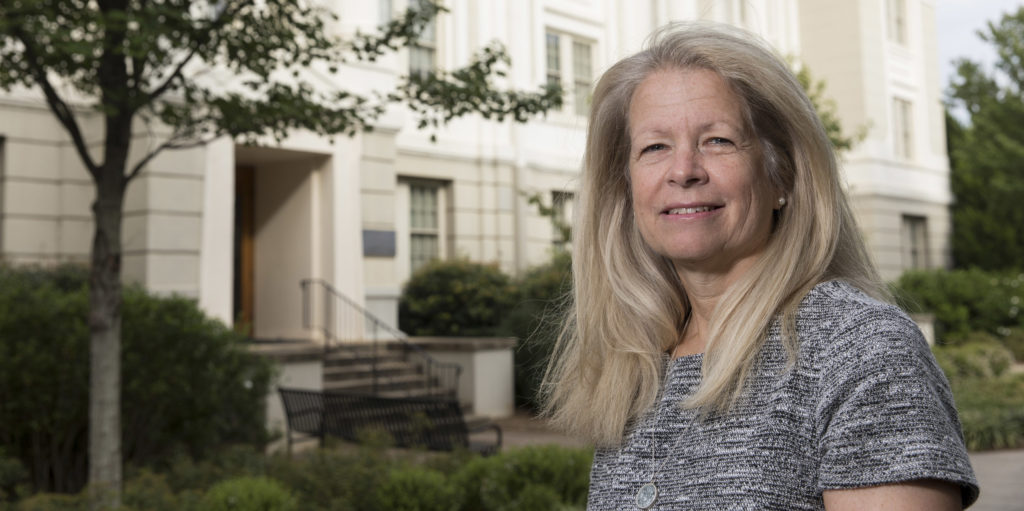Susan Haire, a professor in the School of Public and International Affairs, helps students develop a broader knowledge base, stronger analytical skills and more confidence in their own abilities.
Where did you earn degrees and what are your current responsibilities at UGA?
I earned my bachelor’s degree in political science from UGA. My Ph.D. is from the University of South Carolina. I am currently a professor of political science in the School of Public and International Affairs and serve as director of the Criminal Justice Studies Program.
When did you come to UGA and what brought you here?
I returned to UGA in 1995. I met Dr. Susette Talarico, a member of the political science faculty, who would become my mentor at UGA. She persuaded me to join a strong group of scholars and graduate students in my field, judicial politics. I also knew that it would be rewarding to return to my alma mater.
What are your favorite courses and why?
“Gender, Law, and Politics” is a lively undergraduate course that introduces students to policymaking by courts and legislatures on a range of issues that affect women as well as men. The best part of this course is a simulation where students role-play in a hypothetical appeal before the U.S. Supreme Court. I also enjoy teaching a completely different course, “Criminal Justice Research Methods,” because it allows me to help students develop analytical skills that they will apply during the internship semester when they conduct an original research project on criminal justice issues.
What are some highlights of your career at UGA?
Last year, I won a teaching and mentoring award from the American Political Science Association’s Law and Courts section. The highlight was not the award, but rather reading the letters submitted to the award committee by former graduate and undergraduate students. Another highlight has been obtaining funding from the National Science Foundation for my research, because it suggests that one’s peers find your work to be promising and deserving of support. It also was rewarding because funded projects have provided additional opportunities for political science graduate students to conduct research in the field of law and courts.
How do you describe the scope and impact of your research or scholarship to people outside of your field?
When I speak with those outside of my field, I find that people are curious about courts and judges because their deliberations take place behind closed doors. In a recent presentation on shifts in the demographic composition of the lower federal courts, the audience became involved in discussing how diversity in backgrounds, views, race and gender might affect deliberations of small groups, including appellate panels. As a social scientist, I believe that it is important to describe how our research can yield insights on these competing expectations. Our findings provide support for some ideas (i.e. diverse panels yield longer, more thorough opinions) but do not support other expectations (i.e. diverse panels are not more likely to support minority defendants in most issue areas). These findings, and this line of inquiry, raise important issues for those involved in the selection of judges to sit on the bench.
How does your research or scholarship inspire your teaching, and vice versa?
As a student, I found the best instructors were also enthusiastic about their research. As an academic, I now more fully understand that there are countless ways in which these complement one another. For example, in my undergraduate methods class, instruction focuses on social science research design and data analysis. My instruction is more effective because I am actively engaged in using these methods. Teaching also inspires research when a class explores new ideas and critically evaluates existing claims. Over 20 years ago, I taught a seminar on judicial politics in which two students came up with an interesting way to measure contentiousness in judicial confirmations. They ultimately published this work, and it continues to be cited today (these students are now established political scientists in academia).
What do you hope students gain from their classroom experience with you?
While it varies somewhat with the class, I hope that all of my students walk away with a broader knowledge base, stronger analytical skills, and more confidence in their own abilities.
Describe your ideal student.
Hard-working, curious and respectful of those who may not share the same views.
Favorite place to be/thing to do on campus is…
If it is spring, a walk through North Campus. Any time of year, evening concerts at Hodgson Hall. And, of course, if it is a Saturday in the fall, I must be somewhere between the hedges at Sanford Stadium.
Beyond the UGA campus, I like to…
… travel inside and outside of the U.S. … including Liverpool, England, where I teach in a UGA-led study abroad program.
Community/civic involvement includes….
When our daughters were younger, my husband and I volunteered in community activities that supported youth sports. Currently, we are volunteering through our church with a focus on efforts to help the homeless.
Favorite book/movie (and why)?
My favorite movie is “Forrest Gump” … who would not like a movie of wonderful characters living through historical events that took place in the ‘60s, ‘70s and ‘80s?It might be easier to name a favorite child than to identify a favorite book. I believe that “Unbroken” by Laura Hillenbrand stands out because it is a well-written, compelling story of resilience.
The one UGA experience I will always remember will be…
… standing close to Jimmy Carter as he teased Walter Mondale at a UGA-sponsored symposium commemorating the 30th anniversary of the inauguration of Carter as the 39th president of the United States. Openly sharing their experiences at this symposium, Carter and members of his administration demonstrated a depth of caring about one another and public service that was inspiring.
(Originally published Oct. 15, 2017)
